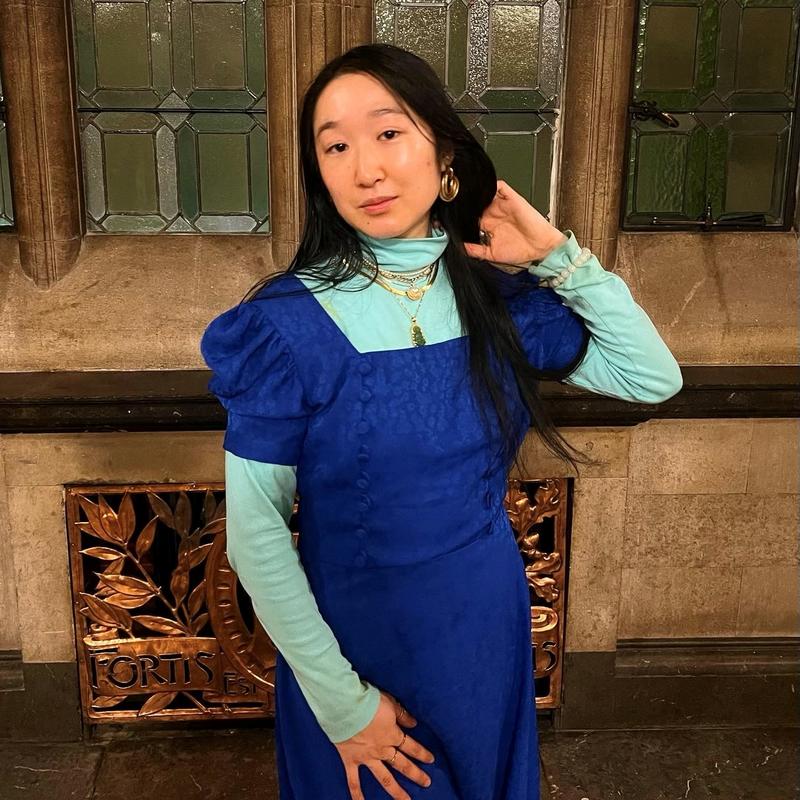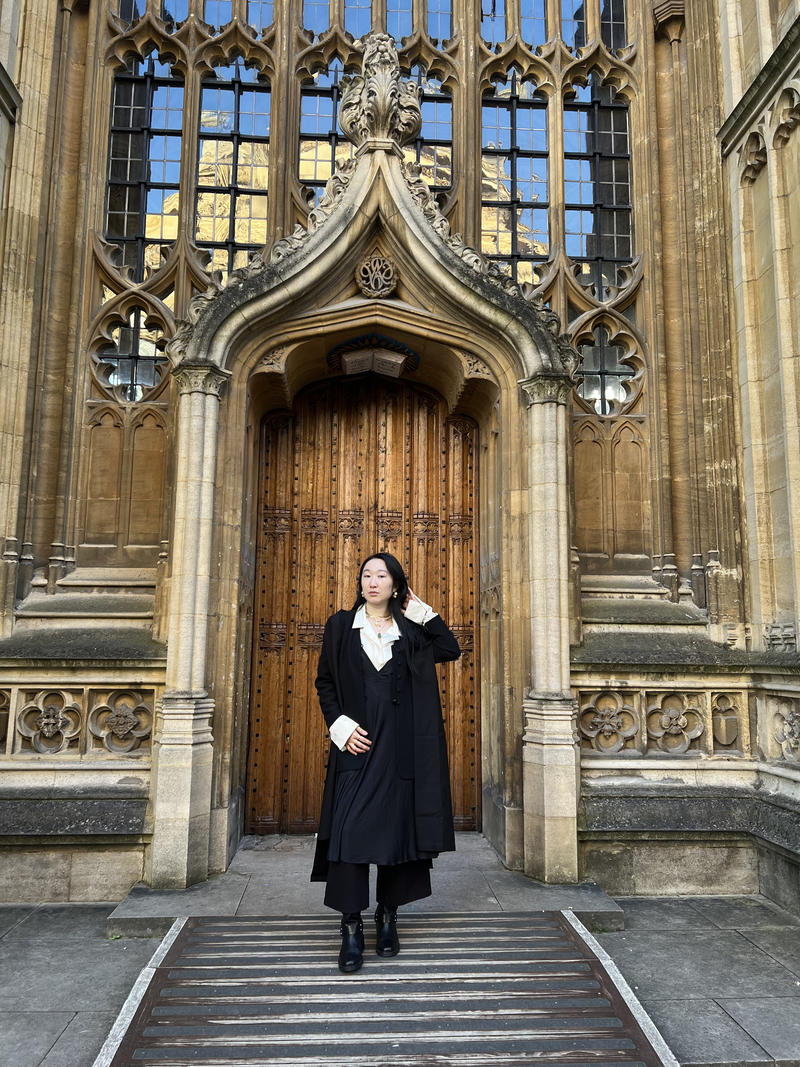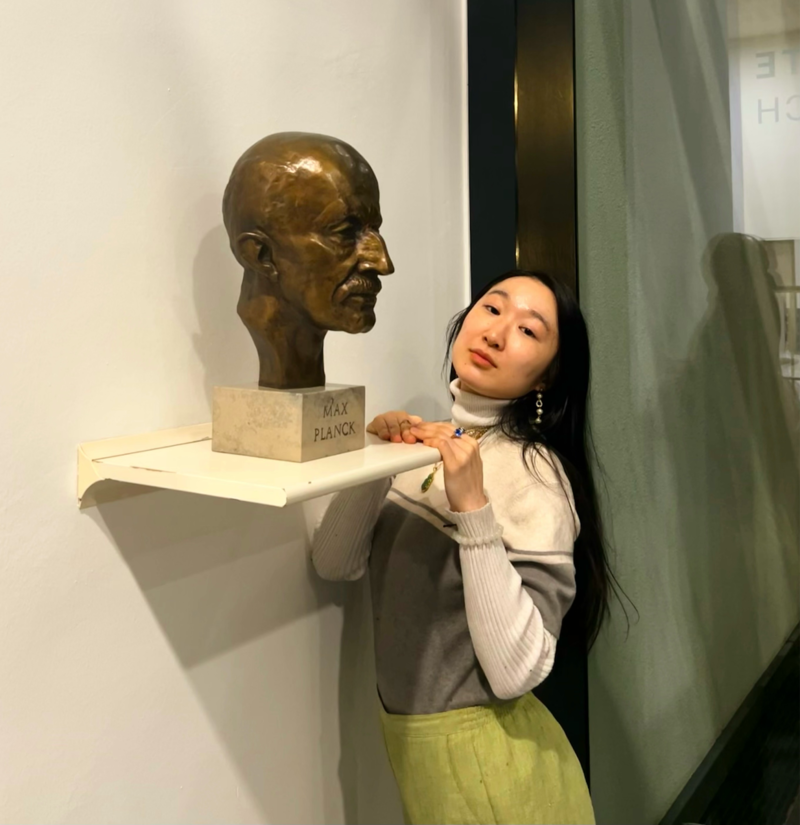DPhil Student Spotlight: Linda Cheng
DPhil Student Spotlight: Linda Cheng
Linda joined the Department in 2023 after completing an MA in computational sociology at Columbia University. They are a Clarendon Scholar and a member of Nuffield College, co-supervised by Professor Ridhi Kashyap.

Why do you study Sociology?
I chose sociology because of my enduring fascination with unravelling the complex webs that make up institutions of contentious social power (e.g., gender, race, colonialism).
Sociology allows us to critically analyse oppressions we take for granted—and the potential to affect change through such elucidation.
What do you enjoy most about studying in Oxford?
I have deeply enjoyed the lovely friendships I’ve built with fellow colleagues in my cohort as well as the Department in general, and my supervisors are amazing and so supportive!
I most appreciate how flexible my course is—both intellectually and academically.
This has challenged me to be more independent in how I manage my time and scholarly tasks, whilst providing me the necessary freedom to explore projects, classes, workshops, and conferences I am interested in.

Linda photographed before the Matriculation Ceremony
What first attracted you to the Department?
Oxford’s unparalleled reputation for advanced quantitative sociology, its outstanding faculty, staff, and students, and the Department’s rigorous yet customisable curriculum is what first drew me to this Department!
Who is your academic hero?
Not to be cliché, but my research and college supervisors! They are: Ridhi Kashyap, Charles Rahal, and Melinda Mills.
They are my academic heroes not only due to their stellar scholarship and expertise, but because of how wonderfully supportive and wise they have been as supervisors! I could not be here without their steadfast support and mentorship.
Where do your research interests lie?
Broadly, I am interested in unravelling the layers of complex mechanisms which make up (post/neo)colonial patriarchal institutions within the current world order, using novel computational methods.
My most recent work, in collaboration with Professor Yao Lu (Columbia University), is forthcoming in the Oxford Handbook of the Sociology of Machine Learning.
It takes a critical decolonial approach to natural language processing (NLP) as both conceptual framework and practical toolkit, pointing out its inherent Eurocentrism and Anglocentrism.
Establishing a new subfield situated at the intersections of sociology, computational methods, and China studies, that I term ‘Chinese computational sociology’, this work suggests new and exciting avenues for the incorporation of non-European languages, particularly Chinese, into NLP frameworks.
My Master’s thesis at Columbia University, forthcoming in Mobilization, uses NLP, novel dictionary methods, feature engineering, and statistical methods to analyse gender bias in media and government attention to protest events in Mainland China.
Of particular interest in this paper is how patriarchy is made, unmade, reified, and transgressed by the actions of individual actors, government bureaucracy, and media institutions.
What piece of advice would you give to prospective students?
Expand your idea of what is in the realms of possibility for you to accomplish.
Oxford is in so many ways an incomparably resource-rich, dynamic intellectual centre. You can achieve your dreams here; you can achieve more than you ever dreamt of.
What are you currently working on?
The first part of my dissertation explores the relationship between gender gaps in access to the internet and offline gender inequalities.
In an age of rapid technological advancement, striking digital gender gaps persist—with women 19% less likely to use mobile internet globally.
Acknowledging the importance of equal access to digital technology, international organisations like the UN and ITU have set goals to bridge this gap by 2030.
Indeed, as access to digital technologies signifies active participation in the public sphere, those in power within patriarchal societies seek to control and/or limit women’s access to such technologies. This calls to question: what role can technology—particularly communications technology—play in shaping gender inequality trends?
Using state-of-the-art big digital trace data from Facebook spanning 2017-2023 and 193 countries, my work presents the first systematic cross-country analysis of the relationship between digital gender gaps and offline gender inequalities spanning more than two years.
Extant theory suggests digital technology could have cogent potential to empower marginalised communities, particularly women in low-income countries. This is critical, as gender inequality kills.
Preliminary results support these theories, pointing to robust positive relationships between increased digital gender equality and gender parity in education, economic participation and opportunity, and life expectancy; the effect is particularly potent for lower-income countries, with decreasing gains for higher-income countries.
This suggests that (1) the role technology plays in gender inequality depends on access to it, rather than its advancement alone; (2) simply increasing women’s access to digital technology (e.g. phones) empowers women in numerous social arenas; (3) while women have greater access to digital technologies within higher-income countries, it does not necessarily guarantee gender parity in public sphere participation.
This research has important theoretical, methodological, and policy implications across diverse fields spanning sociology, demography, gender studies, development studies, and computational social science.
What do you hope to do when you finish your course?
I am excited for wherever my research and interests lead me! I am open to research/policy positions in tech, non-governmental organisations, government, and academia.
I aspire for my research to challenge and change how industry and government conceptualise the relationship(s) between technological development and gender.
What do you like doing outside of Sociology?
There are too many to name! Some things I particularly enjoy: long-distance running, weightlifting and calisthenics, exploring Oxford, fashion/thrifting/modelling, singing (Beijing-opera influenced), playing piano (and I hope to learn Guqin too!), porcelain throwing and glazing, jewellery making, feng shui-inspired aestheticism/interior decoration, Chinese calligraphy (書法) and ink-colour painting (水墨畫), studying Chinese cosmologies and astrology (紫微斗數), reading and composing classical Chinese poetry, writing Chinese lesbian political conspiracy thrillers, nature photography, music production/engineering… And of course, spending time with my beautiful friends!
Additionally, I am the postgrad representative for OULGBTQ+ Society, and LGBT representative for Nuffield College. I am also currently teaching a course on the Politics of Social Movements with an anti-colonial lesbian/queer feminist focus, which I greatly enjoy.
My fashion diary can be found here, and some of my (novice) Chinese calligraphy and ink-colour art can be found here.

Linda attending a conference at the Max Planck Institute for Demographic Research
Cheng, Linda, and Yao Lu (In Press). (2022). “Chapter 5: Chinese Computational Sociology: The Convergence of Machine Learning (ML) and Natural Language Processing (NLP) Methods in Chinese Language Contexts.” In Oxford Handbook of the Sociology of Machine Learning; ML as a methodological toolbox, edited by Juan Pablo Pardo-Guerra and Christian Borch.
Cheng, Linda, Yao Lu, and Han Zhang (In Press). (2024). “Gendered Erasure and Manufactured Passivity: Asymmetric Government and Media Attention to Protests in China.” Mobilization.
Cheng, Linda. (2022). “Resilience Among Gender Marginalized People in China During COVID-19 中國性邊緣者於新冠疫情中的韌性.” 12th Consortium of African and Asian Studies (CAAS) Proceedings (Invited Contributor).
Cheng, Linda. (2022). “Accounting for the Gender-Protest-Media Triad Using Quantitative and Computational Methods.” The Reed (Invited Contributor): 16-20.
Cheng, Linda. (2020). “Breach of Trust as Fuel for Protest: Tiananmen Demonstrations and the Erosion of State-Society Relations in 1980s China.” UNC-CH Senior Honors Theses.
Cheng, Linda. (2019). “Women’s Liberation in China: Necessity or Afterthought?” JOURney 2: 69-73.
You can get in touch with Linda via email.


